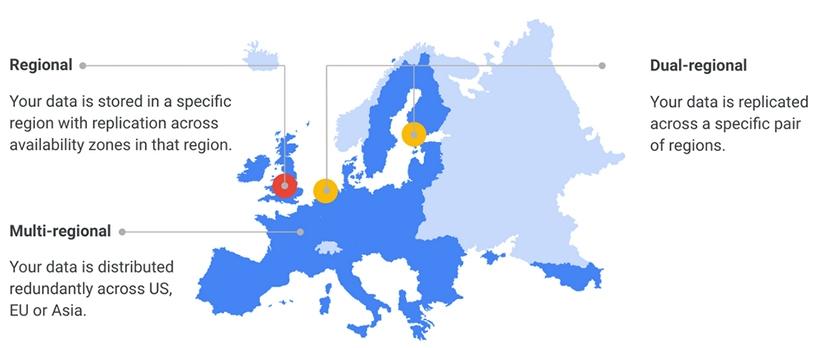
Google Cloud's storage offering has been updated to give customers more control over where their data is stored, letting them store it in a dual-location.
This was announced at the Google Cloud Next 2018 conference in London this week.
The company says Google Cloud Storage is unified object storage that powers many Google Cloud Platform (GCP) customers, letting them store and move data as needed.
"We're pleased to announce that you can now choose to store your data in a dual-regional Cloud Storage location, which is a pair of specific GCP regions. By storing your data in a dual-regional location, you get the availability and business continuity characteristics of geo-redundant storage, with predictable, low-latency storage access for co-located compute resources," the company said in a statement.
The new update, which is in the beta phase, lets users choose from a list of dual-regional pairs when creating a new multi-regional storage bucket. Data in that bucket will automatically be stored geo-redundantly across those specific two regions.
The company, which is trying to differentiate itself from its main cloud rivals Microsoft and Amazon, says there are many benefits to storing data in two locations.
"Dual-regional is especially beneficial for analytics or big data workloads. The closer together you can put your data and compute resources, the faster you can potentially run your analysis.
"It can also help with content serving. If you use a content delivery network (CDN) shield for delivering content, you may want to co-locate the content you're serving geographically close to your CDN shield implementation location."
The new update means users only have to write to a single dual-regional bucket without having to manually copy data between primary and secondary locations.
"No replication tool is needed to do this and there are no network charges associated with replicating the data, which means less overhead for storage administrators out there. In the event of a region failure, we transparently handle the failover and ensure continuity for your users and applications accessing data in Cloud Storage," says Google.
"Data in Cloud Storage is also strongly consistent, so when you create a dual-regional bucket, then follow that up with a request to fetch a list of resources, your resource will be in that response. That is critical for data analytics workloads, where a lack of consistency could mean missing files in your request."
Google Cloud does not currently have any data centres in South Africa, or the African region. The company would not comment on when or if this would change, but did note the region is an important market for Google.
Share